How To
See other How To Articles
Title: 6 Card Games Every Man Should Know
Source:
The Art of Manliness
URL Source: https://www.artofmanliness.com/2017 ... 2/6-card-games-every-man-know/
Published: Nov 22, 2017
Author: Jeremy Anderberg
Post Date: 2017-11-23 05:31:52 by Deckard
Keywords: None
Views: 2863
Comments: 4
Card games have been around for a long time. They’ve existed in various forms for a millennium, having been invented in the Far East. From there, they came West with trading, and in the 1400s the French solidified the 52-card deck and the four suits — spades, clubs, hearts, and diamonds — that we use today. While different cultures and nations use different sets of cards, that system is the most widely used around the world. For literally centuries now, friends, families, and strangers have convened around bar tops, campfires, and dining room tables to play friendly and perhaps not-so-friendly games of cards.
The Appeal (and Manliness) of Card Games
What is it that makes card games so appealing, and why have they found such a particularly prominent place in the culture of men?
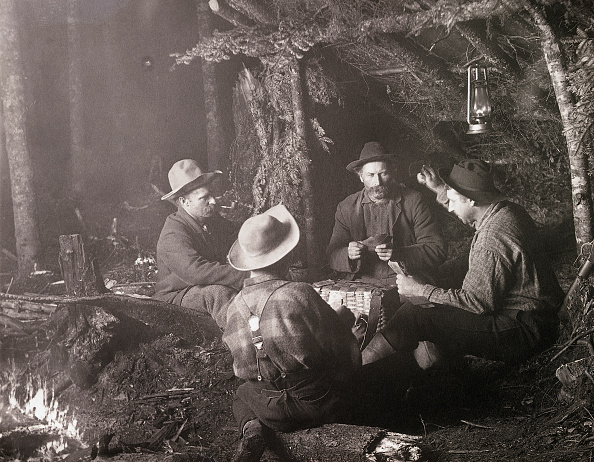
Portability. Rather than having to cart around a game board and various easily-lost pieces, a deck of cards can readily fit into a pocket or other small space. This is one reason they’ve long been popular with sailors and soldiers (as well as travelers and adventurers of all kinds); they can easily be thrown in a pack or seabag and cracked open on the frontlines or the bunk of a submarine.

Speed. Board games often require lengthy set-ups, and games can take a long time. It’s easily forgotten where one is at in the game if a break is needed. Card games, on the other hand, just need a shuffle, and you can play almost anything imaginable. And most games, even long ones, have natural breaks at the end of a hand or deal. You can just as easily play for a few minutes or a few hours.
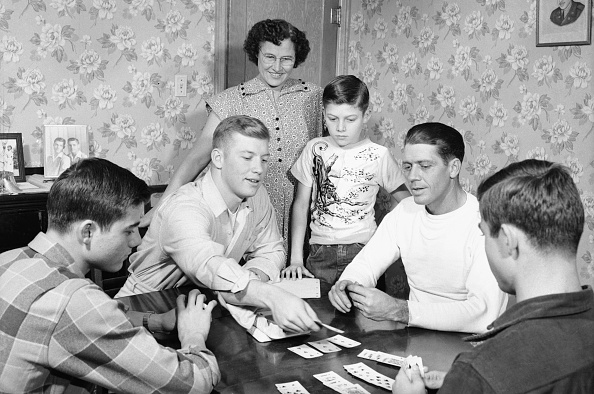
Extra man points if you can identify the fella putting down the card.
Adaptability and informality. Most card games are folk games, with rules being passed on and changed from generation to generation (which is what makes tracing each game’s specific history particularly difficult!). Every family and even region has its own set of rules they prefer, and those rules can continue to evolve based on what’s most enjoyable for the folks playing it. Most games can also be scaled up or down on the challenge level to incorporate kids and expert players alike.
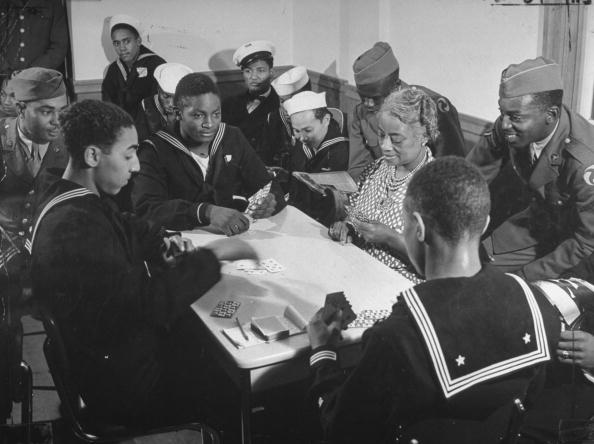
Balance of chance and skill. Games scholar David Parlett writes: “A major attraction of card games is that they are in general neither wholly mindless, like most dice games, nor excessively cerebral, like Chess, but offer a reasonable balance of chance and skill. The actual balance varies from game to game, enabling well-informed players to select from the vast repertoire of card games the one or two best suited to their tastes and talents.” Even though players don’t have control over the chance aspects of games, in times past, a man who had a streak of luck in cards was considered favored by the gods, which enhanced his honor.

Manly competition. It is has often been noted that men’s games are symbolic representations of their more violent clashes in fighting and war. This is as true of something like football as it is of card games. When anthropologist Michael Herzfeld lived among the tough, rugged shepherds of a remote, mountainous region of Crete, he observed that their daily card games were a “medium for the expression of contest in emblematic form.” He writes:
“Contests they most certainly are. One of my most frequent card playing companies would announce, ‘Let’s clash lances [na kondarokhtipisomene]!’ Card games are often described as ‘struggling,’ and valiant opponents as pallikaria (‘fine young men’). Some basis of opposition beyond that of a friendly game is usually sought; when two kinsmen of different generations were matched against each other, even though they were fairly close in age, an onlooker jocularly justified the whole situation by announcing that it was a contest between the old and the young. Almost every move is made with aggressive gestures, especially by the striking of the knuckles against the table as each card is flung down.”
This echo of the basic quest for manhood and honor, the requirement of strategy, and the element of risk and reward, “lends spice to what would otherwise be a daily repetitive activity.”
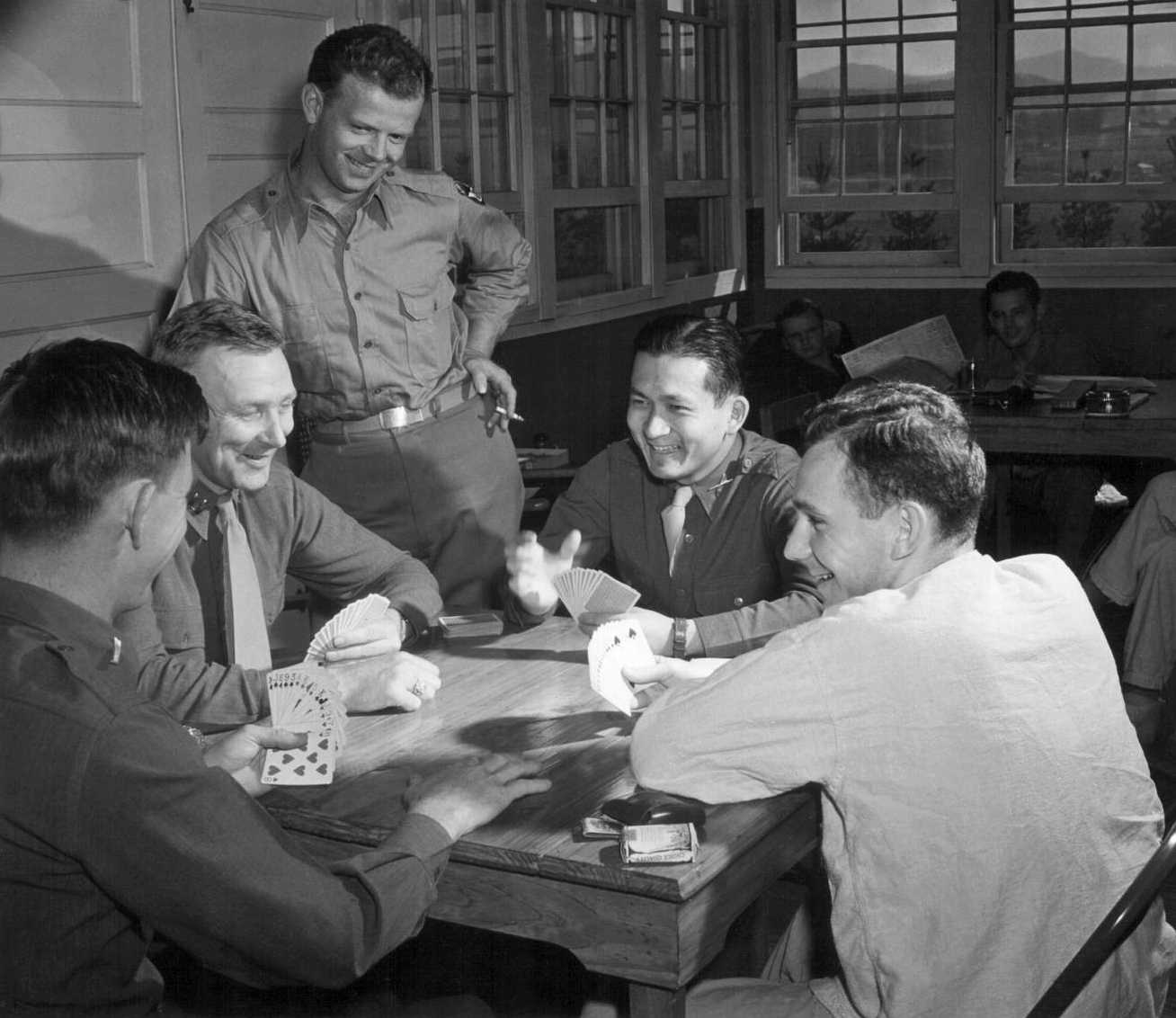
Ease and enjoyment of conversation. Card games facilitate easy, no-pressure conversation; if someone has something to say, they can say it; otherwise, people can just concentrate on the gameplay. Especially when all the participants are men, jokes and insults are traded and contribute to the unique sense of male camaraderie that can emerge around card playing. As Herzfeld notes, while other male activities like hunting or war “require swift and often silent action . . . the card game provides a forum for skill in that other area of demonstrative masculinity, clever talk. The rules of the games themselves are fixed, and therefore of relatively little interest . . . But the conversational gambits, well-timed gestures, and of course the flamboyant triumph of the winners are all legitimate themes in male interaction.”
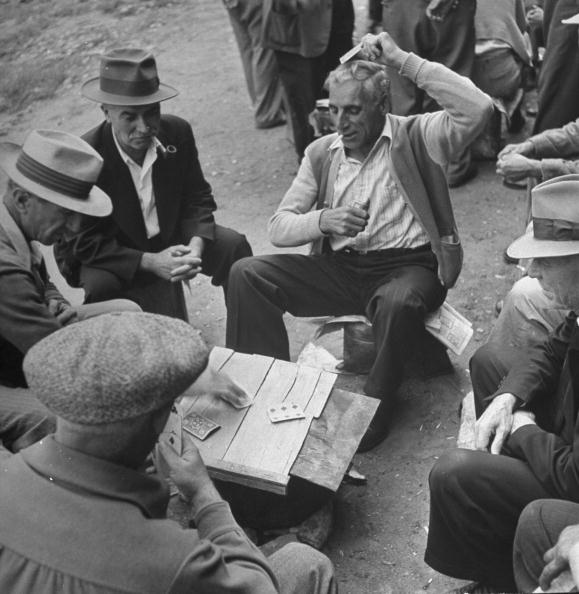
Element of Mystery. Generally in board games, every player is aware of the possible moves of every other player. You roll a die, and everyone else can see what’s going on and if a player is close to winning. With cards, the only thing the other players see is the uniform back of what you’ve been dealt. There’s a fun air of mystery knowing that on your next turn you can go out, and nobody else is the wiser until the moment you exultantly drop your cards on the table.
6 Card Games Every Man Should Know
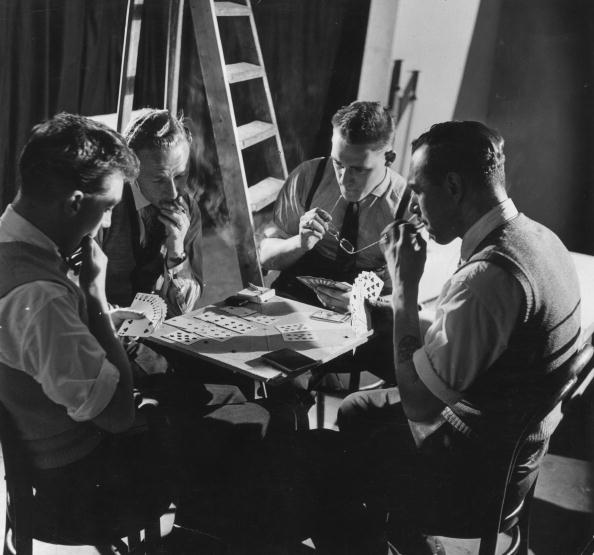
For the reasons above, and the rich history of cards — you can play the same game your grandparents and great-grandparents played, and of course folks well before them! — every man should know a handful of games. The 6 below are a set particularly worth learning, for reasons of both popularity and intrinsic value; they are games that you’re likely to be invited to play by others, and if you aren’t, you should consider asking others to play them, because they’re so enjoyable!
Note: A couple of those listed feature one specific type of a broader category of games (e.g., gin rummy is just one of many types of rummy that can be played). But the general principles of that particular “subgenre” will give you a good idea of how that broader category of game is played.
Gin Rummy
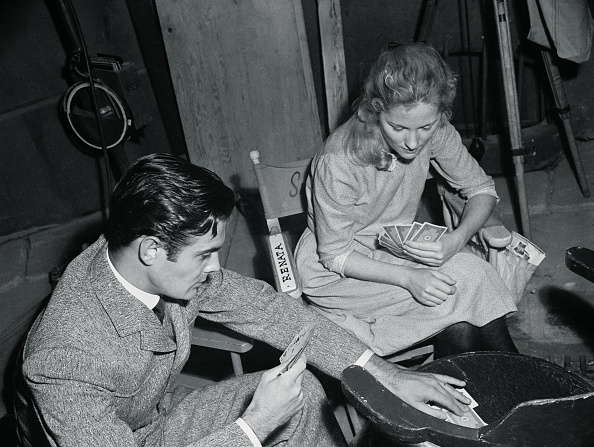
Gin rummy was popular in Hollywood; here co-stars Joan Fontaine and Louis Jourdan play in between shooting scenes for Letter From An Unknown Woman.
Rummy, as a broader category of card games, revolves around gameplay in which participants try to make sets, or melds (in card playing parlance) — generally either 3 (or more) of the same number/rank, or 3 (or more) suited cards in sequence (a run). It’s also a “draw and discard” game, in which players draw a card from either an undealt or discard pile, and throw out an unwanted card as well. When all a player’s cards are part of a meld (or as many as are needed based on the variation), they go out, and get points based on what the remaining players have in their hand. Generally, you’ll play to a set point number, often 100.
Games scholars believe that rummy was originally a card variation on the Chinese tile game mah-jong, and came into being perhaps as early as the 1700s. Through many cultural and regional iterations, gin rummy, as the folk tale goes, was created in 1909 by whist (another card game) teacher Elwood Baker and his son, Charles Baker (who went on to become a renowned screenwriter). It’s thought that they invented the variation as a faster version of standard rummy. The history of gin is hard to suss out, though, since it didn’t really become popular until the 1930s (as with many card games in the US), when the Great Depression forced families to entertain themselves at home. It’s an easier game to learn than bridge, and more family-friendly than something like poker.
Gin rummy then took off in Hollywood and became immensely popular on movie, TV, and Broadway sets as an easy game, with a better reputation than poker, that could be played in dressing rooms and picked up and left off between shoots. In the late 1930s and 1940s you’ll find references to gin and “gin sharks” in numerous films, shows, and plays.
From there, its place in American leisure and game-playing was cemented, and today it’s often a game the whole family knows and plays, particularly when visiting with grandparents.
Click here to learn the rules of gin rummy.
Hearts
The game of hearts falls into the trick-taking category of card games, originally stemming from whist. Rather than wanting to take tricks though, hearts is unique in that you want to avoid collecting tricks, depending on the cards in the pile; hearts are bad, as is the notorious queen of spades (also known as “Calamity Jane” or the “Black Lady” in the game). It’s usually played to 100 points, but the person who gets to 100 is actually the loser, and the person with the lowest points the winner (hearts being a point each, and the queen of spades being 13 points).
Hearts first appeared in the US in the late 1800s, but has origins going to back to a 1600s French game called “reversis.” Like the modern hearts, the goal was to avoid taking tricks that had certain cards in them. While one hindrance to playing hearts is that the modern version requires 4 players to get a game going (though it can be played with more or less, with rule changes), it still enjoyed pockets of great popularity in the 20th century, especially among college students.
The game was then given new life at the end of the millennium when Microsoft Windows included it as a built-in game in their operating systems starting in the 1990s. You had three players provided for you, and could pick up a game anytime you wanted. This was how I learned the game, actually. Practice and learn on a computer or on your phone, then find three friends to play with. It will be far more interesting than staring down Pauline, Michele, and Ben (the default opponents in early Windows versions).
Click here to learn the rules of hearts.
Poker (Texas Hold ‘Em)

Poker is a quintessentially American card game. What makes it unique from any of its antecedents is specifically the betting factor. While the gameplay is reminiscent of some other world games (and also just card-playing in general), the structure of betting sets it apart from anything that came before.
It’s possible that the game originated in 1820s New Orleans on Mississippi River gambling boats. From there, poker spread north along the river, and West along with the Gold Rush, becoming an important part of cowboy lore. When the dirty and tired men were done breaking horses or driving cattle for the day, and needed some entertainment around the campfire, poker became the go-to diversion. It involved skill, luck, and bit more friendly competition than many other card games. Betting — even with just pennies or matchsticks — naturally upped the ante.
Various ranking systems and variations of game play also spread through the country (and eventually around the world), but poker really took off in the late 1980s when Congress passed the Indian Gaming Regulatory Act, which legalized casinos on Native American land. Prior to that, gambling in all forms was far more regulated. Different regions had different popular variations, but Texas Hold ‘Em came to be the most played version in the Western US. In the 2000s, when ESPN began televising the World Series of Poker, and online gameplay took off, Texas Hold ‘Em became the dominant poker game around the world.
What makes poker great is that it retains a very competitive spirit even while playing for low stakes, and it can be scaled up or down depending on the proclivities of the group. You can play for $.05 or $5 or $5,000 or $500,000. Or for Chips Ahoy cookies. It’s also an ideal card game for a large gathering. Have a bachelor party to plan? Or a birthday shindig? Or a weekend guys night while ladies go paint and sip wine? A game of Texas Hold ‘Em in the garage or basement is perfect. To get you started, here’s a primer on the game, and here’s how to host a poker night.
Solitaire
Solitaire, as a group of games played primarily by oneself, was first developed in the mid-1700s, and first appeared codified in writing in the late 1700s. Unlike the other specific games in this article, I’m listing it here as the broad category. Why? For the simple reason that it’s likely everyone already has a preferred version of the game! (Mine is a variation of Kings in the Corners solitaire that I learned from my dad.)
Solitaire was actually first played with multiple people, either by taking turns making moves, or by each person playing with their own deck and seeing who would “win” first. It’s likely that the version played truly alone against just the deck itself came about by people practicing for the multiplayer variety. Soon, innumerable versions of solitaire came about, as any player could really make any set of rules they desired. It’s said that Napoleon played when he was exiled, and although a number of versions of solitaire are named after him, this rumor is likely just that.
As with hearts, solitaire really exploded along with the personal computer. No need to shuffle the deck yourself every time. Klondike, FreeCell, and Spider became the most popular (at least on computers), as those were stocked on most machines back in the 90s. Today, you can download apps that offer hundreds of versions of solitaire.
Try some out (you can peruse the “Solitaire” section of this book, or look them up online), practice playing them by hand versus on a device, and next time you’re bored, rather than automatically jumping to your phone for entertainment, deal out some cards and play solitaire.
Cribbage
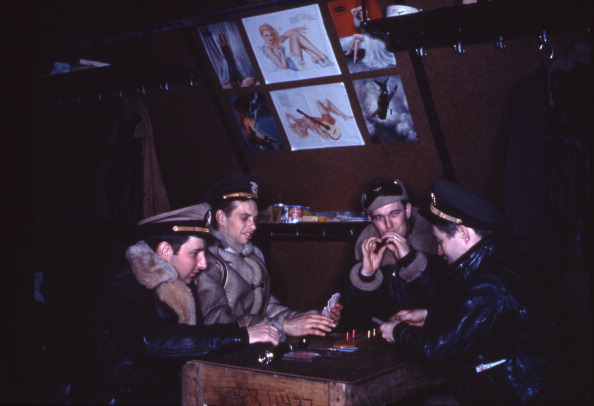
The game of cribbage has been beloved by men for centuries. While it incorporates a board, it’s really a card game for generally 2 people (though 3 and 4 can readily be accommodated with just slight differences), with the board only used to keep easy track of points accumulated. There are two parts to cribbage: pegging (numerically counting your and your opponent’s cards up to 31) and counting (making sets, runs, and 15s with your cards — see rules for more detail). It’s a game that really defies being grouped into other broader categories of games, making it especially fun and unique; there’s not really anything else like it!
Believed to have been invented, or at least codified, by British soldier and poet Sir John Suckling in the 17th century, it was brought to American shores by English settlers where it became quite popular in the colonies, especially in New England. Requiring only two players, it was readily adopted by sailors and fishermen as a way to wile away the time. Cribbage boards, which have either 61 or 121 holes, were (and still are) crafted from a variety of materials (learn how to make your own board here!) and could be quite unique and elaborate in form and style. Eskimos would make cribbage boards out of walrus tusks to trade with the sailors and fishermen who made port near their villages.
Cribbage remained popular with mariners for hundreds of years, enjoying especially widespread play in the Navy during World War II. It was thought of as the unofficial game of submariners, who played round the clock as they patrolled for Japanese ships.
Cribbage continued to be played after the war, and was a favorite game of college students at least up through the previous generation. But it seems to have, along with most other analog games, largely fallen out of favor and sight. It’s not a game that easily adapts to digital play either, meaning a lot of folks know of the game, but don’t necessarily know how to play. Don’t be like those guys.
Click here to learn the rules of cribbage.
Blackjack
Blackjack is unique on this list as it’s primarily a game you’d be found playing in a casino. It’s actually the most widely played casino game there is. Why might that be? Largely because it’s fast to play and easy to learn. You and/or a group of other players are betting against the dealer — just the dealer, you’re not competing against other players — to see whose cards can get closest to adding up numerically to 21 (or at 21) without going over. There’s a bit more nuance to it, but that’s the gist. If you get closer than 21 to the dealer, you win (as does anyone else who did the same). If the dealer is closer to 21, you lose. The value of learning the game is that you’ll be able to walk into a casino — which can be an intimidating place — and know how to confidently play at least one game.
Blackjack (previously called just “21”) was first referenced in writing in a short story by Miguel de Cervantes (of Don Quixote fame) in the early 1600s, meaning it was invented and played likely sometime in the mid or late 1500s. When introduced into US gambling houses in the 1800s, an early, seemingly random rule dictated a 10-to-1 payout if your hand contained a black (spade or club) jack. The name obviously stuck, even though the 10-to-1 payout was quickly abandoned.
The game became more popular in the U.S. in the late 1950s when some math whizzes came up with strategies that enabled the player to gain an advantage over the house. Ed Thorp’s popular 1963 book Beat the Dealer was the first to lay out card counting to the general public, and hopeful players the world over have tried, both successfully and unsuccessfully, to (mostly) legally win millions of dollars (as portrayed in the popular movie 21).
While card counting is technically legal as long you aren’t using some sort of device to help you, it’s very hard to do successfully, and casinos have the right to kick you out and ban you if they don’t like your odds and suspect you of it. So don’t try. Do, however, know the basics of the game so that when you happen to be in Vegas for your brother’s bachelor party, you’ll at least be able to hang around and not just sheepishly watch over his shoulder as a spectator.
Click here to learn the rules of blackjack.
Know these 6 card games and you’ll be able to confidently join in a contest with friends, wile away time with your family on a rainy camping trip, entertain yourself on a long flight, and keep your grandma company every Sunday night. (11 images)
Post Comment Private Reply Ignore Thread
Top • Page Up • Full Thread • Page Down • Bottom/Latest
Pinochle, I've made a lot of money playing that game over the years.
Vegetarians eat vegetables. Beware of humanitarians!
#2. To: CZ82 (#1) (Edited)
Pinochle, I've made a lot of money playing that game over the years.
Hey Brutha -- Happy New Year. Good to see you...
The Uncles would play it back when, but not enough when I was a kid to learn it. And neither did the guys on my block play it...Was it a Polish or Eastern Euro game?
As kids we played Gin and Rummy quite a bit.
The Game of Choice for the Uncles and most everyone as we grew older: HEARTS, aka "Pago." In HS we'd play Poker.
#3. To: Liberator (#2)
The Uncles would play it back when, but not enough when I was a kid to learn it.
I never got the hang of that one either.
Cribbage is big up here in Da Yoo-Pee.
“Truth is treason in the empire of lies.” - Ron Paul

Those who most loudly denounce Fake News are typically those most aggressively disseminating it.
#4. To: CZ82 (#1)
Love playing pinochle. My dad, who is in failing health due to being 84, still allows me and one of my brothers to come over and beat the crap out of him and his wife every few months.
Been playing that game for over 40 years.
'What kind of man gives cigarettes to trees?'
Top • Page Up • Full Thread • Page Down • Bottom/Latest
[Home] [Headlines] [Latest Articles] [Latest Comments] [Post] [Mail] [Sign-in] [Setup] [Help] [Register]
